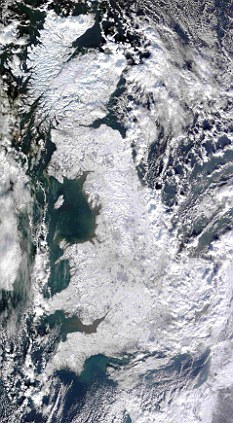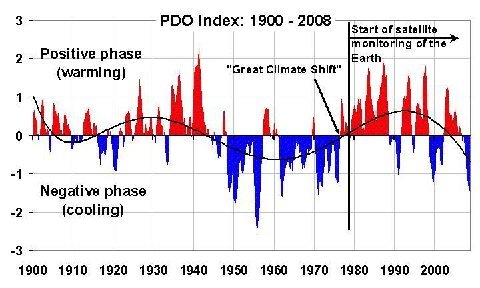Un mini âge de glace ?
L’auteur rapporte l’avis de trois éminents climatologues qui pensent que nous allons sur un refroidissement du climat, et non vers un réchauffement. La période du réchauffement serait achevée.
Forget Global Warming--Mini Ice Age May Be on Its Way
Cornwall’s Evangelical Declaration on Global Warming couldn’t come at a better time--sign today!
You know the wheels are falling off the manmade global warming bandwagon when even the mainstream media begin publishing reports of major scientists who challenge it.
The UK’s MailOnline did just that this week under the headline The mini ice age starts here. Lead paragraph? “The bitter winter afflicting much of the Northern Hemisphere is only the start of a global trend towards cooler weather that is likely to last for 20 or 30 years, say some of the world’s most eminent climate scientists.”
Right. MailOnline reporter David Rose doesn’t call them “the world’s leading climate skeptics.” He calls them “some of the world’s most eminent climate scientists"--and he goes on to cite “Mojib Latif, a leading member of the UN’s Intergovernmental Panel on Climate Change (IPCC),” “Anastasios Tsonis, head of the University of Wisconsin Atmospheric Sciences Group,” and “William Gray, emeritus Professor of Atmospheric Sciences at Colorado State University.”
Contrary to fears of inexorably diminishing Arctic sea ice, Rose cites the U.S. National Snow and Ice Data Center as reporting that “Arctic summer sea ice has increased by 409,000 square miles, or 26 per cent, since 2007.” Though snow’s been unusual for most of the southern half of the United Kingdom in recent decades, the Mail published the accompanying satellite photo of Great Britain during the recent cold snap. The island is essentially all covered with snow.

Rose reported record lows as far south as Cuba--something I can attest to, living near Miami in south Florida, where we experienced sub-freezing weather over the weekend. He quoted Tsonis as saying that last week 56% of the United States was covered by snow--something that hasn’t happened in several decades. And the “‘Arctic oscillation’--a weather pattern that sees the development of huge ‘blocking’ areas of high pressure in northern latitudes, driving polar winds far to the south . . . is at its strongest for at least 60 years. As a result, the jetstream--the high-altitude wind that circles the globe from west to east and normally pushes a series of wet but mild Atlantic lows across Britain--is currently running not over the English Channel but the Strait of Gibraltar.”
Consequently, most of the Northern Hemisphere is much colder this winter than it’s been in decades--and the Southern Hemisphere is cooler, too.
According to Rose, Latif, Tsonis, and other scientists attribute the cold shift primarily to a shift in the world’s dominant ocean circulations--the Pacific Decadal Oscillation and the Atlantic Multidecadal Oscillation--from a warm phase to a cool phase, something that happens about every 20 to 30 years. “The scientists’ predictions also undermine the standard climate computer models, which assert that the warming of the Earth since 1900 has been driven solely by man-made greenhouse gas emissions and will continue as long as carbon dioxide levels rise. They say that their research shows that much of the warming was caused by oceanic cycles when they were in a ‘warm mode’ as opposed to the present ‘cold mode’.”
That’s a point made by Dr. Roy W. Spencer in the science chapter of the Cornwall Alliance’s new document A Renewed Call to Truth, Prudence, and Protection of the Poor: An Evangelical Examination of the Theology, Science, and Economics of Global Warming and illustrated in the graph below.

The Pacific Decadal Oscillation, an index of weather patterns over the North Pacific Ocean,
has coincided with periods of warming and cooling over the last century (JISAO, 2008).
“A significant share of the warming we saw from 1980 to 2000 and at earlier periods in the 20th Century was due to these cycles,” said Latif, “perhaps as much as 50 per cent. They have now gone into reverse, so winters like this one will become much more likely. Summers will also probably be cooler, and all this may well last two decades or longer. The extreme retreats that we have seen in glaciers and sea ice will come to a halt. For the time being, global warming has paused, and there may well be some cooling.”
Tsonis also believes that the ocean current cycles dominated global climate change in the 20th century, including the post-1970s, the period many point to as driven by human greenhouse gas emissions, but he doesn’t venture to attribute specific percentages to the natural and human causes. “I do not believe in catastrophe theories,” Rose quoted him as saying. “Man-made warming is balanced by the natural cycles, and I do not trust the computer models which state that if CO2 reaches a particular level then temperatures and sea levels will rise by a given amount. These models cannot be trusted to predict the weather for a week, yet they are running them to give readings for 100 years.”
Gray went farther: “Most of the rise in temperature from the Seventies to the Nineties was natural. Very little was down to CO2--in my view, as little as five to ten per cent.”
Gray, Tsonis, and Latif all agreed that the findings about the ocean currents undermined the credibility of the computer climate models on which the IPCC and other alarmists rely.
Such findings support the Cornwall Alliance’s view that global climate changes are overwhelmingly natural, not manmade, that human contribution to them is not dangerous, and that the effort to fight global warming is needless, with costs far exceeding benefits.
Source : http://www.cornwallalliance.org/blog/item/forget-global-warming-mini-ice-age-may-be-on-its-way/




/http%3A%2F%2Fwww.cpdh.info%2Fnpds%2Fimages%2Ftopics%2Ftit_envir.jpg)
/https%3A%2F%2Fassets.over-blog.com%2Ft%2Fcedistic%2Fcamera.png)